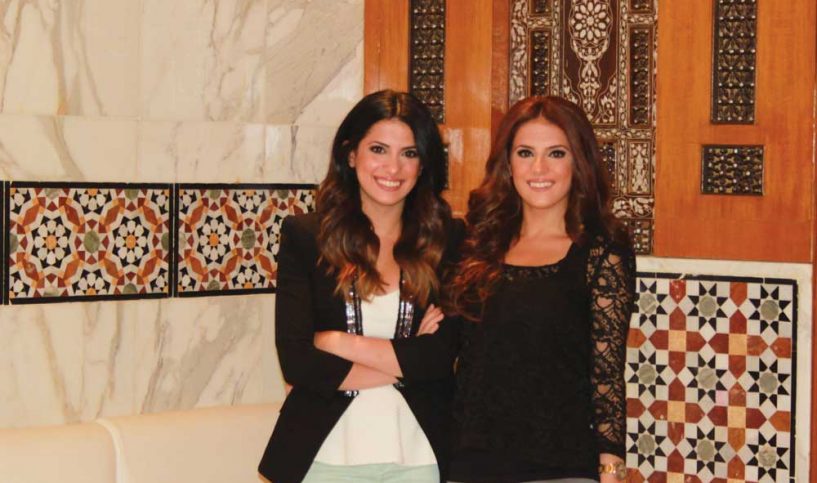According to the World Health Organization (WHO), Mental Disorders affect an estimated 450 million people worldwide, including countless Kuwaitis. Five out of ten leading causes of health disability are mental disorders, and by 2020, depression will be the second most disabling health condition in the world! This puts it ahead of heart disease, road traffic accidents, and chronic obstructive pulmonary disease.
Yet, mental disorders – which include common disorders like depression and anxiety – and people suffering from them do not get the attention they deserve. In the field of health care, and particularly public health in Kuwait, mental health not only tends to take a back seat, but also a seat of indifference. In fact, public clinics do not even have mental health professionals easily accessible to patients.
Twins, Alaa and Dalal Alhomaizi, who are currently studying psychology at Northeastern University in Boston, decided it was time there was some balance. With near perfect grades, the identical twins were easily eligible for a scholarship from the Ministry of Higher Education. However, their selection of Major of psychology lost them that scholarship.
“When we went to apply for a scholarship, my father was asked by a prominent official at the Ministry for Higher Education why he would allow his daughters to deal with ‘crazy’ people and if he, or any Kuwaiti for that matter, would ever seek a psychologist. Despite my father jumping to our aid by stating that he thinks there is no shame in seeing a psychologist if they needed to, we never got the scholarship. Not only did they not support our choice and disrespected people with mental illnesses, who should never be called ‘crazy’, they were biased against the field of psychology in general by claiming it is not needed in Kuwait!” revealed Dalal.
“You can only imagine,” says Alaa, referring to their disappointing episode with the educational official, “how prejudiced our society is towards people with mental disorders, if they are this prejudiced towards people working in the field of psychology.”
However, it wasn’t until they attended a class on ‘Deviant Behavior and Social Control’ at Northeastern University, that they realized how pervasive the problem of stigma really was and that it did not only exist in Kuwait.
“We were shocked to learn about the inhumane way people with mental illness are treated in almost all societies of the world at almost every point in human history. The fact that we are in the 21st century, and society still disrespects, dehumanizes, institutionalizes, and looks down upon people with mental illness is just disgraceful. It is unfair, unfounded, and we knew we had to do something about it.”
In 2011, the twins initiated an anti-stigma and mental health advocacy campaign S.P.E.A.K., an acronym for Standing for Psychological Education and Awareness in Kuwait. It is through SPEAK that Alaa and Dalal are aiming to spread awareness by educating people. “It is fundamental to separate the myths from the facts,” explained Alaa, because they believe it’s the stigma attached to mental illnesses, its treatments, as well as the field of psychology, which needs to be eradicated.
“With education, we want others to know how they can help or find help, to understand the importance of mental health, and most importantly, we want to promote equality and respect for those individuals suffering from a mental illness,” they explained, adding, “People need to seek treatment instead of refusing or denying it in fear of a judgmental society.”
So, how does SPEAK help? “We spread the word through popular media, like Twitter and Facebook, and our open online forum (ask.fm/speakuwait) is both interactive and informative,” explained Dalal, as she proceeded to give me a glimpse of it on her phone. “We help people living with psychological problems by spreading the truth about mental illness and psychology. This campaign was started to be the voice of those who are quieted by society’s judgment and rejection. People living with mental illness are fathers, mothers, siblings, friends, and classmates. They are just like you and me; there is absolutely no difference. Somebody had to give voice to this neglected topic, to promote the rights of every Kuwaiti citizen to be aware of and benefit from mental health.” Fortunately, Alaa and Dalal believe Kuwait is eager for this change. Their forum addresses a wide spectrum of questions, which are answered by the girls. Even parents have approached them seeking assistance.
SPEAK has held a number of successful events in Kuwait and Boston, including a presentation at the Women’s Cultural Social Society in January 2012. Their work has been featured in National newspapers, magazines, and blogs as well as International media such as the Boston Globe. Alaa and Dalal’s research for SPEAK was featured in the Undergraduate Honors Evening at Northeastern University and will be presented in the National Collegiate Honors Conference this November.
What’s next? This fall, on World Mental Health Day, SPEAK will host an unprecedented event, an event unlike any other Kuwait has had before. On October 10 and 11, SPEAK in association with the Ministry of Health will host a conference featuring leading psychiatrists from Harvard Medical School and Massachusetts General Hospital, the Number 1 hospital in the USA. The department of psychiatry at Massachusetts General Hospital has been ranked No.1 for 16 consecutive years!
When asked how they were able to convince Harvard doctors into coming to Kuwait for their conference, Alaa responded, “We had been working in this department as research assistants for 4 months when we decided to approach our manager with our idea. We were very prepared and we created a fully developed plan. After 2 months of meetings, the leaders of the department enthusiastically approved and supported our event.” The two-day event will include large public presentations in the evening and seminars for doctors and health professionals in the morning.
These two enthusiastic youngsters’ vision for the future is just as clear as their research and statistics were for this interview. The twins plan to change the field of mental health in Kuwait, not only for the public and professionals, but for future generations as well.
That might surely take a lot of effort and dedication, but at twenty-three, Alaa and Dalal seem to be lacking in neither. They efficiently juggle their advocacy campaign along with their undergraduate honors education and a part-time research internship in the Department of Psychiatry at Massachusetts General Hospital.
For SPEAK’s upcoming events log on to FaceBook: speakuwait. You can contact Alaa & Dalal through Twitter @speakuwait or by email at speakuwait@hotmail.com.








